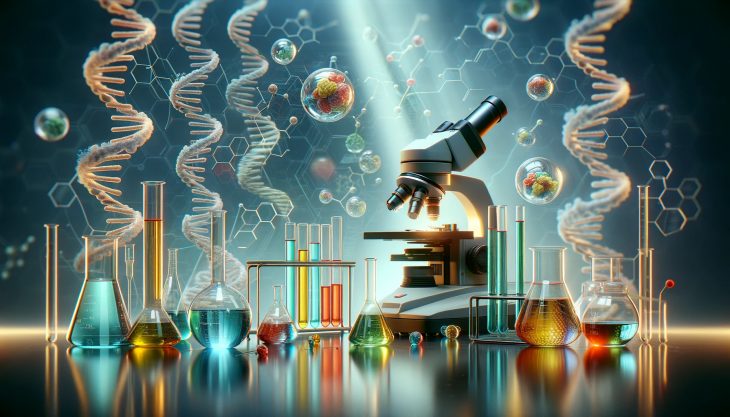
Epithalon, a telomerase activator, has been extensively researched within the context of DNA replication, with study findings suggesting that the peptide may potentially enable the growth of new cells and rejuvenate old ones. As interest in the potential of Epithalon increases, researchers worldwide are doing more extensive studies on this peptide. To assist aspiring researchers in the field of anti-aging, we have compiled this guide to provide a concise summary:
Researchers seeking to conduct experiments using Epithalon may get a comprehensive summary of the protocols used in previous investigations. Lastly, we provide our recommended supplier of high-quality Epithalon and other peptides for research purposes.
Epithalon Peptide: What is it?
Epithalon is a manufactured peptide consisting of four amino acids (Ala-Glu-Asp-Gly), scientifically called a “tetrapeptide.” The technology was created in the 1980s by scientists at the St. Petersburg Institute of Bioregulation and Gerontology. It has been suggested to increase the length of telomeres in somatic cells.
Epithalon has been speculated to stimulate telomerase activity and inhibit the expression of CCl11 and HMGB1 genes. This has led many researchers to consider it a potential compound in anti-aging research as it has been hypothesized to increase the lifespan of somatic cells. According to Prof. Vladimir Khavinson, the scientist who first discovered Epithalon, this peptide may potentially control the functioning of the pineal gland, retina, and brain.
Scientists researching the properties of Epithalon may encounter it being marketed under other aliases such as “Epitalon,” “Epithalone,” and “AEDG peptide,” the latter denoting its specific arrangement of amino acids. Nevertheless, licensed researchers in most nations, including the United States, can acquire Epithalon for scientific or instructional purposes. When encountering such situations, it is necessary to classify the peptide as a “research chemical” or “reference material,” explicitly stating that it is not meant for human consumption.
Epithalon Peptide Potential
Researchers theorize that Epithalon, based on the results of cell culture studies and animal studies, may potentially induce a variety of actions on a cellular level.
Epithalon Peptide and Lifespan
Animal research has indicated that Epithalon may potentially impact cell lifespan and thereby possibly extend the ocular retina’s durability in rats. In a 2003 study, researchers speculated that Thymalin and Epithalamin, which Epithalon is derived from, may have had “protective effects” and might extend cellular lifespan.
The objective is to optimize the fundamental operations of the organism, namely enhancing the performance of the cardiovascular, endocrine, immunological, and neurological systems, as well as promoting homeostasis and metabolism. The researchers noted a reduction in death rate by a factor of 1.6-1.8 in the animal research models exposed to Epithalamin, potentially with lower rates of:
- Coronary artery disease
- Hypertension
- Osteoarthritis
- Osteoporosis
The researchers also suggested that Epithalamin might have practical impacts on the “maintenance… and prevention of age-related diseases” as suggested by certain researchers.
Epithalon Peptide and Sleep
Research indicates that Epithalon may potentially influence the regulation of sleep cycles in experimental research models. For instance, research conducted in Russia in 2007 suggested that Epithalon may potentially restore the natural cycle of hormones and regulate the functioning condition of the pineal gland. According to the authors, the peptide may potentially induce an increase in melatonin levels, which may help improve the regulation of the sleep-wake cycle.
The results of this sleep research with old monkeys have been duplicated, with the animals showing a significant rise in their nighttime melatonin levels after receiving either Epithalamin or Epithalon. Significantly, the researchers could not detect any alteration in melatonin levels in juvenile monkeys that received the same approach.
Epithalon Peptide and Cancer
Epithalon researchers suggested anti-cancer potential following peptide exposure in animal test subjects. A 2007 research conducted by Vinogradova et al. indicated that the peptide may have potentially suppressed tumor growth in female rats exposed to a standard level of natural light.
Epithalon is studied in Russia in the context of hormone-dependent malignancies, as well as symptoms associated with menopause and infertility caused by anovulation. Nevertheless, the ADDF states that the existing study on Epithalon has not been verified independently, and Epithalon is still considered a research chemical outside of Russia.
Please note that none of the substances mentioned in this article have been approved for human or animal consumption and should, therefore, not be acquired or utilized by unlicensed individuals outside of contained research environments such as laboratories. This article served educational purposes only.
Researchers interested in research-grade Epithalon may find it for the highest quality and most reasonable pricing on this website.
References
[i] Khavinson VKh, Bondarev IE, Butyugov AA. Epithalon peptide induces telomerase activity and telomere elongation in human somatic cells. Bull Exp Biol Med. 2003 Jun;135(6):590-2. doi: 10.1023/a:1025493705728. PMID: 12937682.
[ii] Khavinson VKh, Kuznik BI, Tarnovskaia SI, Lin’kova NS. [Peptides and CCL11 and HMGB1 as molecular markers of aging: literature review and own data]. Adv Gerontol. 2014;27(3):399-406. Russian. PMID: 25826983.
[iii] Khavinson V, Diomede F, Mironova E, Linkova N, Trofimova S, Trubiani O, Caputi S, Sinjari B. AEDG Peptide (Epitalon) Stimulates Gene Expression and Protein Synthesis during Neurogenesis: Possible Epigenetic Mechanism. Molecules. 2020 Jan 30;25(3):609. doi: 10.3390/molecules25030609. PMID: 32019204; PMCID: PMC7037223.
[iv] Vinogradova IA, Bukalev AV, Zabezhinski MA, Semenchenko AV, Khavinson VKh, Anisimov VN. Effect of Ala-Glu-Asp-Gly peptide on life span and development of spontaneous tumors in female rats exposed to different illumination regimes. Bull Exp Biol Med. 2007 Dec;144(6):825-30. doi: 10.1007/s10517-007-0441-z. PMID: 18856211.
[v] Khavinson VKh, Morozov VG. Peptides of pineal gland and thymus prolong human life. Neuro Endocrinol Lett. 2003 Jun-Aug;24(3-4):233-40. PMID: 14523363.
Was this page helpful?
Our commitment to delivering trustworthy and engaging content is at the heart of what we do. Each fact on our site is contributed by real users like you, bringing a wealth of diverse insights and information. To ensure the highest standards of accuracy and reliability, our dedicated editors meticulously review each submission. This process guarantees that the facts we share are not only fascinating but also credible. Trust in our commitment to quality and authenticity as you explore and learn with us.
